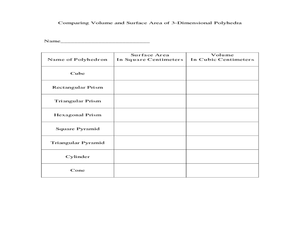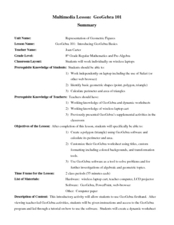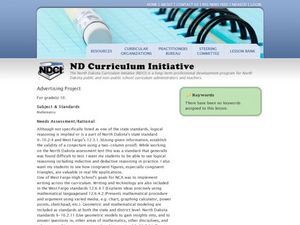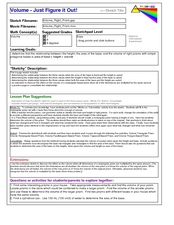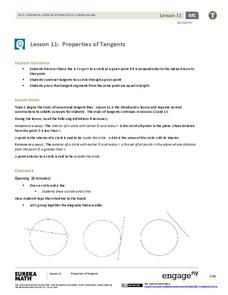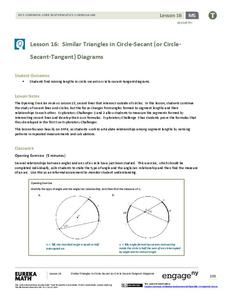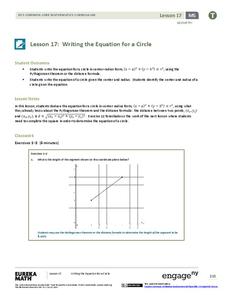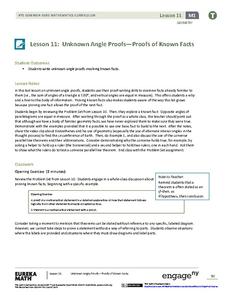Curated OER
The Value of Volume
Students measure the perimeter and area of their polygons. In this geometry lesson, students calculate the volume and area using the correct tools. They calculate the time and temperature and the perimeter and side lengths of triangles.
Curated OER
Introduction to Polyhedra
Students investigate Euler's Formula. In this geometry lesson, students perform an inductive activity of Euler's Formula using nets to identify a variety of prism, pyramids, cylinders, and cones.
Curated OER
Geogebra Basics
Students identify basic geometric shapes using Geogebra. In this geometry instructional activity, students work on a laptop as they explore different geometric shapes. They calculate the area and perimeter of triangles.
Curated OER
Areas of Trapezoids, Rhombuses and Kites
Students calculate the area of different polygons. In this geometry lesson, students find the area for trapezoids, rhombuses and kites.
Curated OER
Deductive and Inductive Reasoning
Students differentiate between inductive and deductive reasoning. For this geometry lesson, students identify congruent figures and examine logos for congruency.
Curated OER
Scale Drawing
Students use ratio and proportions to solve problems. In this geometry lesson, students apply ratio and proportions to real life scenarios.
Curated OER
Shape Recognition
Students explore geometry by analyzing different shapes. In this shape identification lesson, students discuss the characteristics that make certain shapes unique and the same characteristics that cause shapes to look the same. Students...
Curated OER
Triangle Island
Students calculate the altitude of triangles. In the web based lesson, students explore the interior distance from a given point in a polygon to its side. They compute the sum of these lengths. Students read life...
Curated OER
Triangle Inequality Theorem
Students use the inequality theorem to solve triangles and their properties. In this geometry instructional activity, students are given spaghetti of different lengths and asked to create triangles. They conclude the necessary length...
Curated OER
3-D Attributes
Students explore geometric solids. In this geometry instructional activity, students listen to the book The Greedy Triangle by Marilyn Burns, then work in groups to sort geometric solids into various categories. Students define geometric...
Curated OER
Is it a Polygon?
Second graders investigate polygons. In this geometry lesson, 2nd graders practice identifying characteristics of polygons on the overhead using a T-45 calculator display. Students play the game "Guess My Rule" to identify what polygons...
Curated OER
Volume of Prisms
Students calculate the volume of different polygons. In this geometry lesson plan, students identify the relationship between base and height. They calculate the area of each prism and cylinder.
Curated OER
Daily Upkeep 7
In this geometry worksheet, 4th graders complete a quick set of math activities where they first identify which portion of a model is shaded in fraction form. Then, they select which angle best describes a given angle. Finally, students...
Curated OER
Mass Measurement
Middle schoolers explore geometry by completing a physics activity on-line. In this mass measurement lesson, pupils define the terms mass, volume, and density and identify their relationship with each other. They complete an on-line...
EngageNY
Properties of Parallelograms
Everyone knows that opposite sides of a parallelogram are congruent, but can you prove it? Challenge pupils to use triangle congruence to prove properties of quadrilaterals. Learners complete formal two-column proofs before moving on to...
EngageNY
How Do 3D Printers Work?
If we stack up all the cross sections of a figure, does it create the figure? Pupils make the connection between the complete set of cross sections and the solid. They then view videos in order to see how 3D printers use Cavalerie's...
EngageNY
Rectangles Inscribed in Circles
Putting a rectangular object into a circular one—didn't the astronauts on Apollo 13 have to do something like this? Learners first construct the center of a circle using perpendiculars. They then discover how to inscribe a rectangle in a...
EngageNY
Properties of Tangents
You know about the tangent function, but what are tangent lines to a circle? Learners investigate properties of tangents through constructions. They determine that tangents are perpendicular to the radius at the point of tangency,...
EngageNY
Similar Triangles in Circle-Secant (or Circle-Secant-Tangent) Diagrams
First angle measures, now segment lengths. High schoolers first measure segments formed by secants that intersect interior to a circle, secants that intersect exterior to a circle, and a secant and a tangent that intersect exterior to a...
EngageNY
Writing the Equation for a Circle
Circles aren't functions, so how is it possible to write the equation for a circle? Pupils first develop the equation of a circle through application of the Pythagorean Theorem. The lesson then provides an exercise set for learners to...
EngageNY
Points of Concurrencies
You say that perpendicular bisectors intersect at a point? I concur! Learners investigate points of concurrencies, specifically, circumcenters and incenters, by constructing perpendicular and angle bisectors of various triangles.
EngageNY
Triangle Congruency Proofs (part 1)
Can they put it all together? Ninth graders apply what they know about proofs and triangle congruence to complete these proofs. These proofs go beyond the basic triangle congruence proofs and use various properties, theorems, and...
EngageNY
Translations
Learn through constructions! Learners examine a translation using constructions and define the translation using a vector. Pupils then construct parallel lines to determine the location of a translated image and use the vector as a guide.
EngageNY
Unknown Angle Proofs—Proofs of Known Facts
Lead the class in a Greek history lesson with a geometric twist. Pupils relate a short video about geometric properties to modern-day methods of solving for unknown angles. They discuss parallel line theorems and complete...
Other popular searches
- Math Art Geometry Lessons
- Math Geometry Lessons
- Geometry/math Literature
- Esl Lessons Math Geometry
- Geometry Math Centers
- Geometry Math Stations
- Geometry Math
- 4th Grade Geometry Math Units
- Math Geometry Reflections
- Esol Lessons Math Geometry
- Traffic Signs Math Geometry
- Mummy Math Geometry


